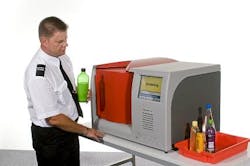SORS Raman spectroscopy scanner from Cobalt allows liquids back into the aircraft cabin
Harwell, England--Cobalt Light Systems, a company formed to commercialize laser-based spectroscopy technology spun-out of the Science and Technology Facilities Council (STFC) Rutherford Appleton Laboratories, received European approval for its INSIGHT100 bottle scanner, which enables aircraft passengers to carry liquid items larger than 100 ml once more. Airports will be able to allow passengers to take items such as water, cosmetics, and perfumes through airport security channels as early as 2013. INSIGHT100 screens individual bottles—through the opaque containers without opening them--in less than 5 seconds to determine whether there is a security threat.
The INSIGHT100 system uses a STFC-pioneered and proprietary technology called Spatially Offset Raman Spectroscopy (SORS). Professor Pavel Matousek of STFC’s Rutherford Appleton Laboratory, and inventor of the SORS technique, said, "Since STFC made the breakthrough in discovering SORS a few years ago, we have worked closely with the team at Cobalt Light Systems to develop and refine this technology. It is particularly exciting to see how this particular scientific development could now go on to make a real difference to the safety and wellbeing of our society."
The INSIGHT100 scanner exceeded the European Civil Aviation Conference (ECAC) standard for use at airports with an almost perfect detection capability and negligible false-alarm rate in unopened containers, and can even identify explosives unambiguously inside opaque bottles such as colored plastic shampoo containers or green glass wine bottles. The system is currently in trials at several major airports.
The development of the INSIGHT100 was funded under the Innovative Research Call in Explosives and Weapons Detection (2010) initiative, a cross-government program sponsored by a number of government departments and agencies under the CONTEST strategy. The restriction on liquids was introduced following a failed al-Qaeda bomb plot in August 2006 to bring down several airliners departing London for North America—the terrorists aimed to use liquid explosives carried onto aircraft in bottles. Recently, the European Commission agreed to relax the limit on liquids by introducing new screening measures from April 2013. In just over a year from now, passengers will again be allowed to carry on that expensive bottle of champagne as a gift for friends, provided the bottle is screened.
SOURCE: Cobalt Light Systems; www.cobaltlight.com/news/2012/insight100-attains-ecac-standard-bottle-screening

Gail Overton | Senior Editor (2004-2020)
Gail has more than 30 years of engineering, marketing, product management, and editorial experience in the photonics and optical communications industry. Before joining the staff at Laser Focus World in 2004, she held many product management and product marketing roles in the fiber-optics industry, most notably at Hughes (El Segundo, CA), GTE Labs (Waltham, MA), Corning (Corning, NY), Photon Kinetics (Beaverton, OR), and Newport Corporation (Irvine, CA). During her marketing career, Gail published articles in WDM Solutions and Sensors magazine and traveled internationally to conduct product and sales training. Gail received her BS degree in physics, with an emphasis in optics, from San Diego State University in San Diego, CA in May 1986.
